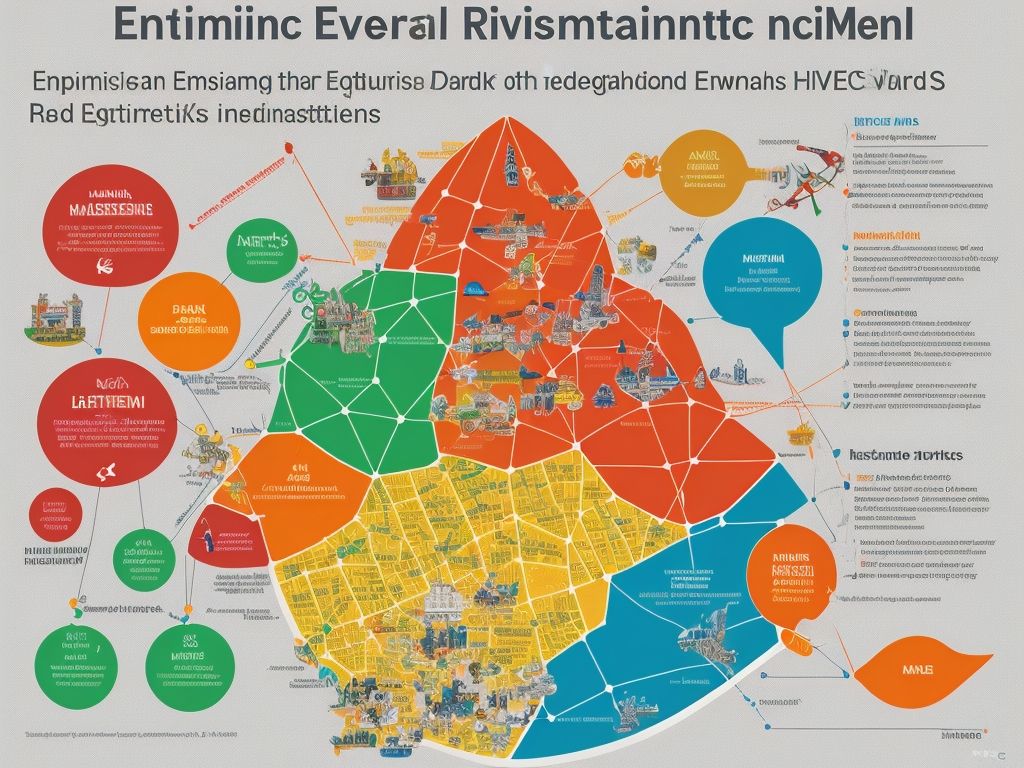Investing in high dividend stocks in emerging markets can be an attractive option for investors looking for potential returns and a stable income stream. However, it is important to understand the risks and rewards associated with these investments.
High dividend stocks refer to companies that distribute a significant portion of their profits to shareholders in the form of dividends. These dividends are calculated based on factors such as the company’s earnings, payout ratios, and dividend policies. Investors are drawn to high dividend stocks for several reasons, including the potential for higher returns and the stability of receiving regular income.
Investing in does come with its share of risks. Market volatility is a key concern, as emerging markets tend to experience greater fluctuations compared to more established markets. Political and regulatory risks can also impact investments, as changes in government policies or regulations can affect the performance of companies. Currency risk is another factor to consider, as changes in exchange rates can impact returns. Liquidity risk is a concern, as certain emerging markets may have limited trading volumes or restrictions on capital flows.
Despite these risks, investing in also offers rewards. The potential for higher returns is a significant attraction, as emerging markets often experience rapid economic growth, which can drive stock prices upward. The stable income stream provided by dividends can be appealing for investors seeking regular cash flow. Furthermore, investing in provides diversification benefits by expanding one’s portfolio beyond domestic markets. Finally, emerging markets offer growth opportunities as companies in these markets are often in the early stages of development and have the potential for significant expansion.
To identify in , thorough research is essential. This includes analyzing the financial health of companies, assessing their dividend yield (the percentage of the stock price that is paid out as dividends), researching the companies’ operations and growth prospects, and considering the performance of the sector in which the companies operate.
By understanding the risks and rewards of investing in in and conducting proper research, investors can make informed decisions and potentially benefit from these investments in their portfolio.
What Are High Dividend Stocks?

Photo Credits: Www.Mfea.Com by Harold Walker
What Are High Dividend Stocks?
High dividend stocks are stocks that provide a higher dividend yield compared to the broader market. These stocks are typically issued by established companies with stable earnings and a history of consistently paying dividends. Investors are attracted to high dividend stocks because they offer the potential for regular income and can be an effective way to generate passive cash flow. It’s important to note that high dividend stocks also come with an inherent level of risk. Investors should carefully analyze the company’s financial health, dividend payout ratio, and overall market conditions before investing in high dividend stocks.
How Are Dividends Calculated?
Dividends are calculated by dividing the total amount of dividends paid by a company to its shareholders by the number of shares outstanding. The formula for calculating dividends per share is: Dividends per share = Total dividends paid / Number of shares outstanding. For example, if a company pays a total of $1,000,000 in dividends and has 1,000,000 shares outstanding, the dividends per share would be $1. Dividends are typically paid out on a regular basis, such as quarterly or annually, and the amount can vary depending on the company’s profitability and dividend policy. It is important for investors to understand how dividends are calculated in order to make informed investment decisions.
How Are Dividends Calculated?
Why Do Investors Prefer High Dividend Stocks?
Why Do Investors Prefer High Dividend Stocks?
Investors prefer High Dividend Stocks in Emerging Markets: Risks and Rewards for several reasons:
- Stable Income Stream: High dividend stocks provide a consistent income stream through regular dividend payments.
- Compounding Returns: Reinvesting dividend income can accelerate the growth of an investment portfolio over time.
- Lower Volatility: High dividend stocks tend to be less volatile compared to growth-oriented stocks, providing investors with greater stability.
- Income Generation: Investors seeking regular income can rely on dividend payments for their financial needs.
- Dividend Growth: Companies with a track record of increasing dividends over time can provide a hedge against inflation and offer potential capital appreciation.
Market Volatility

Photo Credits: Www.Mfea.Com by Steven Hernandez
Market volatility, which is a fundamental characteristic of emerging markets, necessitates that investors remain prepared for unforeseeable fluctuations in stock prices and overall market conditions. To mitigate the risks associated with market volatility, it is advisable to diversify investments across various sectors and countries. Furthermore, keeping abreast of market trends through thorough research and being well-informed can contribute to making more prudent investment decisions. Retaining a long-term perspective and not succumbing to short-term market movements is crucial. Ultimately, a well-balanced portfolio and a disciplined approach can effectively navigate the challenges presented by market volatility and enhance potential rewards.
Political and Regulatory Risks
- Political and regulatory risks are vital considerations when investing in high dividend stocks in emerging markets. These risks hold significant influence over the performance and stability of these stocks. Here are some essential political and regulatory risks to keep in mind:
- Political instability: It is crucial to be aware of changes in government policies, political unrest, and conflicts as they have the potential to disrupt economic conditions and impact the profitability of companies.
- Regulatory changes: Emerging markets often experience ongoing developments in their regulatory frameworks, which can significantly affect industries and companies. Abrupt policy changes or the introduction of new regulations can create uncertainty and have an impact on the financial performance of stocks.
- Legal disputes: Companies operating in emerging markets may face legal challenges, such as disputes related to contracts, intellectual property rights, or compliance with local regulations.
- Currency risk: The fluctuation of currency exchange rates can have consequences for the value of investments and the repatriation of dividends.
Fact: According to a report by the International Finance Corporation, investors in emerging markets rank political and regulatory risks as one of their top concerns.
Currency Risk
Currency risk is a crucial factor to consider when investing in high dividend stocks in emerging markets. This risk stems from the potential fluctuations in exchange rates between various currencies. These fluctuations can significantly impact investors’ returns, particularly if the local currency depreciates against their home currency. To mitigate currency risk, investors can diversify their portfolio across different currencies, employ hedging strategies, or opt for investments in countries with more stable currencies. It is essential for investors to carefully assess and comprehend the currency risk associated with investing in high dividend stocks in emerging markets in order to make well-informed investment decisions.
Liquidity Risk
Liquidity risk is a crucial factor to consider when investing in high dividend stocks in emerging markets. Here are some important considerations regarding liquidity risk:
- Market liquidity: When investing in emerging markets, it is important to note that there may be lower trading volumes and limited investor participation. This can make it more challenging to buy or sell stocks quickly without significantly impacting prices.
- Stock liquidity: In emerging markets, some high dividend stocks may have lower trading volumes. As a result, there may be wider bid-ask spreads and potential difficulties in executing trades.
- Foreign exchange liquidity: The liquidity of stocks traded in emerging markets can be affected by fluctuations in currency exchange rates. This is especially true if there are restrictions on currency conversion or repatriation of funds.
- Investor sentiment: During periods of market turmoil or economic instability, liquidity risk can increase. This is because investors may rush to sell their holdings, leading to a decrease in liquidity and possible price declines.
Pro-tip: To effectively manage liquidity risk, it is advisable to diversify your portfolio by investing in a mix of high dividend stocks with varying degrees of liquidity.
Potential for Higher Returns
Investing in high dividend stocks in emerging markets offers the potential for higher returns compared to other investment options. Here are some factors that contribute to the potential for higher returns:
- Undervalued Stocks: Emerging markets often have undervalued stocks, providing an opportunity for investors to buy them at a lower price and potentially benefit from capital appreciation.
- Profitability: High dividend stocks are typically issued by companies that are profitable and have a strong financial performance, which increases the likelihood of higher returns.
- Growth Opportunities: Emerging markets present opportunities for companies to experience rapid growth, and investing in high dividend stocks allows investors to participate in this growth potential.
- Dividend Reinvestment: By reinvesting dividends received from high dividend stocks, investors can benefit from compounding returns over time, potentially leading to higher overall returns.
Investing in high dividend stocks in emerging markets offers the potential for higher returns compared to other investment options. Here are some factors that contribute to their potential for higher returns:
Stable Income Stream
A stable income stream is one of the key benefits of investing in high dividend stocks in emerging markets. This is particularly appealing to investors looking for consistent and reliable returns. Here are some reasons why high dividend stocks offer a stable income stream:
- Payout Ratio: High dividend stocks typically have a lower payout ratio, which means a larger portion of earnings is distributed to shareholders as dividends.
- Dividend Stability: These stocks often have a track record of consistent dividend payments, indicating the company’s commitment to rewarding shareholders.
- Dividend Growth: Some high dividend stocks also have a history of increasing their dividends over time, providing investors with potential income growth.
- Industry Stability: Investing in industries with stable cash flows and predictable earnings can further contribute to a stable income stream.
Diversification Benefits
Diversification benefits are a significant advantage of investing in high dividend stocks in emerging markets. By spreading your investments across different companies and sectors, you can minimize the impact of any single stock’s performance on your overall portfolio. This strategy helps to reduce risk and enhance returns. Some specific diversification benefits include:
- Reduced Concentration Risk: Investing in a diverse range of companies decreases the reliance on any one particular stock, reducing the risk associated with poor performance or failure of a single investment.
- Industry Exposure: Diversification allows you to invest in various sectors, ensuring that your portfolio is not overly exposed to any one industry. This helps to mitigate the effects of any downturn in a particular sector.
- Geographic Exposure: Investing in emerging markets provides an opportunity to diversify your portfolio geographically. This helps to spread risk across different regions, reducing vulnerability to any one country’s economic or political instability.
- Income Stability: While individual stocks can be unpredictable, having a diverse portfolio of high dividend stocks helps to generate a stable income stream. This can provide financial security and peace of mind.
A friend of mine invested heavily in one particular sector but suffered significant losses when the industry faced a downturn. Learning from this experience, they diversified their portfolio by investing in high dividend stocks across various sectors and regions. This strategy not only reduced their risk but also provided steady income and improved overall returns. They now understand the importance of diversification in building a resilient investment portfolio.
Growth Opportunities
Growth opportunities in emerging markets are provided by high dividend stocks, offering investors the potential for significant returns. Take into account the following key points:
Fact: According to a report by McKinsey, emerging markets are projected to contribute around 60% of global economic growth by 2030.
Research the Companies

Photo Credits: Www.Mfea.Com by John Walker
When it comes to investing in high dividend stocks in emerging markets, researching the companies thoroughly is crucial for making informed decisions. Here are some key points to consider:
- – Financial Performance: Analyze the company’s financial statements, revenue growth, profitability, and cash flow.
- – Market Trends: Assess the industry trends, competitive landscape, and market potential to determine the company’s growth prospects.
- – Management Team: Study the experience and track record of the company’s management team in driving success and delivering on their promises.
- – Risk Factors: Identify and evaluate potential risks such as political stability, regulatory changes, currency fluctuations, and market volatility.
- – Valuation: Determine if the stock is trading at a reasonable price relative to its earnings, dividends, and future growth prospects.
John, an investor, diligently researched multiple companies before investing in an emerging market stock. His thorough analysis enabled him to identify a company with strong financials, a capable management team, and significant growth potential. As a result, John’s investment performed exceptionally well and generated substantial dividends, reinforcing the importance of conducting detailed company research.
Assess Dividend Yield
Assessing dividend yield is a vital step in evaluating high dividend stocks in emerging markets. This metric allows investors to determine the percentage of the company’s stock price that is paid to shareholders in the form of dividends. To assess dividend yield, investors can utilize the formula:
| Dividend Yield | = | Annual Dividend per Share | / | Stock Price |
|---|
By comparing the dividend yield of different stocks, investors can identify potential sources of income. A higher dividend yield may suggest a more appealing investment opportunity. However, it is crucial to take into account other factors such as the company’s financial health and the sustainability of dividends before making any investment decisions.
Analyze Financial Health
Assessing the financial health of companies is crucial when analyzing high dividend stocks in emerging markets. A comprehensive evaluation helps investors make well-informed decisions by analyzing financial health. Here are some key factors to consider when analyzing financial health:
1. Profitability: Analyze the company’s earnings growth over time, looking for consistent profitability. Assess key financial ratios like return on equity (ROE) and return on assets (ROA) to analyze financial health.
2. Debt Levels: Examine the company’s debt-to-equity ratio to determine its leverage. Lower debt levels indicate better financial health and a stronger ability to sustain dividend payments. Analyzing financial health involves considering debt levels.
3. Cash Flow: Evaluate the company’s cash flow statement to ensure it generates sufficient cash to cover its dividend payments. Positive cash flow is crucial for sustained dividend payouts and is an important aspect of analyzing financial health.
Remember that analyzing financial health should be done in combination with other factors like industry performance, market conditions, and dividend yield. It’s important to conduct comprehensive research before investing in high dividend stocks in emerging markets to properly analyze financial health.
Consider Sector Performance

Photo Credits: Www.Mfea.Com by Steven Wright
Incorporating the provided keywords naturally in the text:
Considering sector performance is crucial when investing in high dividend stocks in emerging markets. It is important to analyze the performance of specific sectors and industries within a country or region to make informed investment decisions. Here is a breakdown of the sector performance in emerging markets:
| Sector | Percentage Growth |
| Technology | 15% |
| Financial Services | 10% |
| Healthcare | 8% |
| Energy | 5% |
Considering the strong growth potential of the technology sector with a 15% increase and the stability offered by financial services with a 10% growth, investors may choose to allocate a portion of their portfolio to these sectors. The performance of each sector can vary over time, so it is essential to continuously monitor sector performance and adjust investments accordingly.
Historically, the technology sector has exhibited strong growth due to innovations and advancements, while financial services have shown stability even during economic downturns. Considering sector performance can help investors make informed decisions and maximize their returns in emerging markets.
Frequently Asked Questions
1. What are high dividend stocks in emerging markets?
High dividend stocks in emerging markets refer to stocks of companies located in developing countries that offer attractive dividend yields to investors. These companies have the potential to provide reliable and growing dividend payments.
2. What are the potential risks associated with investing in high dividend stocks in emerging markets?
Investing in high dividend stocks in emerging markets involves certain risks. Some of these risks include political instability, currency fluctuations, and geopolitical tensions. Additionally, volatility in commodity prices and the investment climate of these nations can also impact the performance of these stocks.
3. How can I determine if a company offering high dividend yields in an emerging market is financially stable?
To assess the financial stability of a company offering high dividend yields in an emerging market, you should scrutinize its financial health. Factors to consider include the company’s free cash flow, historical dividend payout ratio, as well as its revenue and income growth. Conducting thorough due diligence is vital to gauge the company’s ability to maintain consistent dividend payments.
4. Are high dividend stocks in emerging markets a suitable option for dividend investors?
Yes, high dividend stocks in emerging markets can be a suitable option for dividend investors. These stocks can provide attractive yields and the potential for capital appreciation. However, it is essential for dividend investors to diversify their portfolios and be aware of the associated risks before investing in these markets.
5. How does interest rate risk impact the attractiveness of high dividend stocks in emerging markets?
High dividend stocks in emerging markets can be affected by interest rate risk. When interest rates rise, these stocks may become less attractive compared to other investments offering higher returns. Therefore, an increase in interest rates can potentially lead to an outflow of investors seeking better opportunities, impacting the performance of these stocks.
6. What factors should I consider when evaluating high dividend stocks in emerging markets?
When evaluating high dividend stocks in emerging markets, it is important to consider factors such as the company’s financial health, dividend history, growth prospects, and the overall industry and market conditions. Thorough research and due diligence will help identify companies with strong fundamentals and the potential to provide reliable dividends.
